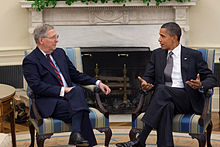One of the dumber debates in recent history has broken out in the wake of Justice Antonin Scalia's passing. Senate Majority Leader Mitch McConnell has suggested that President Obama shouldn't nominate a replacement for Justice Scalia because Obama is in the last year of his final term.
Opponents, including the president himself, have responded that the Senate has a constitutional duty to bring Obama's appointments to a vote and to confirm one, if qualified.
Both sides are completely wrong. The President has the legitimate authority to nominate a successor on every day of his presidency, up to and including the very last day. That precedent was set by no less than the second president of the United States. As Elizabeth Warren astutely observed,
Article II Section 2 of the Constitution says the President of the United States nominates justices to the Supreme Court, with the advice and consent of the Senate. I can't find a clause that says "...except when there's a year left in the term of a Democratic President.
But neither can be found the words "shall bring to an up or down vote" or anything to the effect that the Senate is required to take action on the President's nominees. The Constitution was deliberately constructed so that inaction would be the starting point in all matters. The reason for the separation of powers was to ensure that things didn't get done efficiently within the federal government, because efficient government is a threat to liberty.
Democrats cite this latest controversy as another example of Congress deliberately "obstructing" the President, implying they are overriding the wishes of the people who elected him. We heard the same nonsense about the Democratic Congress during Reagan's presidency. It doesn't compute. The people who elected the president also elected the sitting Congress, in both cases.
That Congress can in any way "obstruct the president" is a horrible, fascist, un-American idea. It assumes the lives of hundreds of millions of people are to be ruled by the wishes of one person, with Congress merely a procedural rubber stamp to legitimize the emperor's policies. This is autocratic thinking straight out of Hobbes' Leviathan, which asserted an elected assembly could be tolerated as long as it conformed without exception with the wishes of the absolute monarch.
The American republic supposedly rejects this idea. The U.S. Constitution assumes Congress is the supreme power, vested with the "sovereign functions of legislation," as Thomas Jefferson put it. The President is supposed to be a subordinate executor of its laws.
James Madison actually warned his countrymen in Federalist #48 that the chief danger to liberty resided in the legislative body, because "the executive magistracy is carefully limited."
The problem is nobody seems to think this way anymore, neither politicians, the media nor the electorate. Presidential candidates from both parties routinely talk as if they going to legislate, whether it is Republicans promising, as president, to "repeal Obamacare" or Democrats promising to make college "free." The media constantly represent presidential elections as far more important than congressional ones and social media posts from across the political spectrum cry out that only their candidate can "save the country."
While the measuring stick is certainly a point for contention, the two presidencies Americans generally regard as the most successful in recent history, Reagan's and Clinton's, coexisted with openly hostile Congresses. Those considered most disastrous occurred when the White House and Congress were unilaterally held by one party. That should be telling American voters something.
The Constitution has an amendment process that would allow more power to be transferred to the presidency if most Americans truly wanted it that way. But whether they realize it or not, they've usually voted to obstruct the president themselves, regardless of his party, quickly electing opposition in at least one branch whenever one party has controlled the White House and both houses of Congress.
Nominating a replacement for Scalia is clearly a prerogative of the executive under the Constitution. Confirmation is clearly delegated to the Senate. Both are elected directly by the people. If the President nominates Scalia's replacement and the Senate refuses to confirm the nominee, the nation will survive. The erosion of the separation of powers and belief in an imperial presidency poses a much greater danger than an empty Supreme Court Justice seat.

